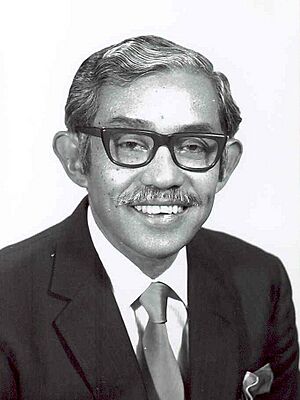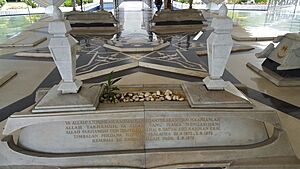Ismail Abdul Rahman facts for kids
Quick facts for kids
Yang Amat Berbahagia Tun Dr.
Ismail Abdul Rahman
SSM PMN SPMJ
|
|
|---|---|
| إسماعيل عبدالرحمن | |

Official portrait, pre-1963.
|
|
| 2nd Deputy Prime Minister of Malaysia | |
| In office 22 September 1970 – 2 August 1973 |
|
| Monarch | Abdul Halim |
| Prime Minister | Abdul Razak Hussein |
| Preceded by | Abdul Razak Hussein |
| Succeeded by | Hussein Onn |
| Minister of Home Affairs | |
| In office 20 May 1969 – 2 August 1973 |
|
| Monarch | Ismail Nasiruddin Abdul Halim |
| Prime Minister | Tunku Abdul Rahman Abdul Razak Hussein |
| Preceded by | Abdul Razak Hussein |
| Succeeded by | Ghazali Shafie |
| In office 1965–1967 |
|
| Monarch | Ismail Nasiruddin |
| Prime Minister | Tunku Abdul Rahman |
| Preceded by | Tunku Abdul Rahman |
| Succeeded by | Abdul Razak Hussein |
| Minister of Trade and Industry | |
| In office 3 January 1973 – 12 August 1973 |
|
| Monarch | Abdul Halim |
| Prime Minister | Abdul Razak Hussein |
| Preceded by | Office established |
| Succeeded by | Hussein Onn |
| Minister of Commerce and Industry | |
| In office 20 September 1959 – 17 November 1959 |
|
| Monarch | Abdul Rahman |
| Prime Minister | Tunku Abdul Rahman |
| Preceded by | Tan Siew Sin |
| Succeeded by | Khir Johari |
| Minister of External Affairs | |
| In office 3 February 1959 – 31 August 1960 |
|
| Monarch | Abdul Rahman Hisamuddin |
| Prime Minister | Tunku Abdul Rahman |
| Preceded by | Tunku Abdul Rahman |
| Succeeded by | Tunku Abdul Rahman |
| 2nd Deputy President of the United Malays National Organisation |
|
| In office 22 September 1970 – 2 August 1973 |
|
| President | Abdul Razak Hussein |
| Preceded by | Abdul Razak Hussein |
| Succeeded by | Hussein Onn |
| Member of the Malaysian Parliament for Johore Timor (Parliament suspended 13 May 1969 – 20 February 1971) |
|
| In office 11 September 1959 – 2 August 1973 |
|
| Preceded by | Himself (as Member of the Malayan Federal Legislative Council for Johore Timor) |
| Succeeded by | Abdul Rahman Sabri |
| Member of the Malayan Federal Legislative Council for Johore Timor | |
| In office 1955–1959 |
|
| Preceded by | Constituency established |
| Succeeded by | Himself (as Member of the Malaysian Parliament for Johore Timor) |
| Personal details | |
| Born |
Ismail bin Abdul Rahman
4 November 1915 Johor Bahru, Johor, Unfederated Malay States, British Malaya (now Malaysia) |
| Died | 2 August 1973 (aged 57) Kuala Lumpur, Malaysia |
| Resting place | Makam Pahlawan, Masjid Negara, Kuala Lumpur |
| Political party | United Malays National Organisation (UMNO) |
| Other political affiliations |
Barisan Nasional (BN) |
| Spouse |
Norashikin Mohd Seth
(m. 1950) |
| Relations | Suleiman Abdul Rahman (brother) Awang Hassan (brother-in-law) Mohd Ghazali Mohd Seth (brother-in-law) Abu Bakar Suleiman (nephew) Yahya Awang (nephew) |
| Children | 6 (including Tawfik Tun Dr Ismail) |
| Parents |
|
| Alma mater | Queen's College, The University of Melbourne (MBBS) |
Tun Dr. Ismail bin Abdul Rahman (Jawi: إسماعيل بن عبدالرحمن; 4 November 1915 – 2 August 1973) was an important Malaysian politician. He served as the second Deputy Prime Minister of Malaysia from September 1970 until his death in August 1973.
As a member of the United Malays National Organisation (UMNO) political party, he held several important government jobs. Many people called him "the man who saved Malaysia." This was because of his strong actions as Minister of Home Affairs after a period of serious unrest in 1969.
Contents
Early Life and Education
Ismail was born on 4 November 1915 in Johor Bahru, Johor. His father, Abdul Rahman Mohamed Yassin, was a respected leader. He was the first head of the Senate in Malaysia and also started Maybank, a big bank.
Ismail's family believed strongly in education. He went to school at Sekolah Bukit Zaharah and later the English College Johore Bahru. He made friends with people from different backgrounds, which helped him have a fair view of all races.
Studying Medicine Abroad
In 1945, Ismail became the first Malay person to earn a medical degree (MBBS) from the University of Melbourne, Australia. His time studying abroad greatly shaped his ideas. He learned to treat everyone equally, no matter their background.
Starting a Political Career
After returning to Malaya, Ismail opened his own medical clinic. His family was very active in fighting against the Malayan Union. This was a plan by the British that many Malays felt would harm their special position.
Ismail joined the United Malays National Organisation (UMNO) in 1951. He became a vice-president of the party. He believed UMNO should fight for Malaya's independence.
Working for Independence
Ismail played a key role in getting more power for local governments. He was also part of the group that went to London to talk about Malaya becoming independent from the British.
He strongly supported the Razak Report, which was about education. This report aimed to make Malay the national language. Ismail argued that if non-Malays accepted Malay as the national language, they should be granted citizenship. This idea was an early version of what became known as the Malaysian social contract.
After Independence
After Malaya gained independence in 1957, Ismail became Malaya's first ambassador to the United States and the United Nations. He held both jobs at the same time until 1959.
At the UN, he believed Malaya should have an "independent line" in its foreign policy. This meant not being influenced by other countries. He also wanted the main political parties to unite into one multi-racial party.
Serving as a Minister
When he returned to Malaya in 1959, he became the Minister of External Affairs. Later, he became the Minister of Internal Security and then Home Affairs. In these roles, he was in charge of keeping public order. He used the Internal Security Act (ISA), which allowed detention without trial. He believed this law was necessary for safety, but also that it needed public oversight.
Forming Malaysia
In 1963, Malaya joined with Singapore, Sabah, and Sarawak to form Malaysia. Ismail kept his government jobs. He strongly supported the idea of an "Association of Southeast Asia," which later became Association of Southeast Asian Nations (ASEAN).
Ismail also defended Malaysia at the United Nations when Indonesia opposed the new country. He even brought weapons captured from Indonesian soldiers to a UN meeting to show proof.
He was also critical of Lee Kuan Yew, Singapore's Prime Minister, for trying to reduce the focus on race in Malaysian politics. This disagreement eventually led to Singapore leaving Malaysia. However, Ismail believed Singapore and Malaysia would one day reunite.
In 1966, Ismail received the highest honour in Malaysia, the Darjah Yang Mulia Setia Mahkota Malaysia. This award gave him the title of Tun. He resigned from his government jobs in 1967 due to health reasons.
The 1969 Unrest
In the 1969 general election, there was a lot of political tension. After the election, serious unrest broke out in Kuala Lumpur on 13 May.
Ismail was asked to rejoin the government as Home Affairs Minister. He helped manage the situation. A state of emergency was declared, and a special group called the National Operations Council (NOC) was formed to restore order. Ismail believed that some political parties had played "communal politics," focusing too much on differences between groups.
Ismail was known for being fair but tough. He helped bring stability back to the country. He was seen as a strong and principled leader by people of all races.
Becoming Deputy Prime Minister
In 1970, Ismail was appointed the second Deputy Prime Minister. He took over from Tun Abdul Razak, who became Prime Minister. Ismail knew that Abdul Razak was secretly ill.
Ismail himself discovered he had cancer. His family urged him to retire again, but he felt it was his duty to help Abdul Razak. He delayed his own treatment to continue working.
Death and Legacy
On 2 August 1973, Tun Dr. Ismail suffered a massive heart attack and passed away. He was 57 years old.
His death was a shock to the nation. He was the first person to be buried at the Makam Pahlawan (Heroes' Mausoleum) near Masjid Negara (National Mosque) in Kuala Lumpur. He was also the first to receive a Malaysian state funeral.

Ismail is remembered for his strong belief in a fair and multi-racial Malaysia. He avoided focusing on just one group of people. He was known for being honest and hardworking. Many people, including important leaders, respected him for his integrity and fairness.
Places Named After Him
Many places in Malaysia are named after Tun Dr. Ismail to honour his contributions:
- Taman Tun Dr Ismail, a township in Kuala Lumpur, and the KG10 MRT station that serves it.
- SK Tun Dr Ismail, a primary school in Padang Rengas, Perak.
- SMK Tun Dr Ismail (STUDI), a secondary school in Muar, Johor.
- Kolej Tun Dr. Ismail, a residential college at Universiti Kebangsaan Malaysia, Bangi, Selangor.
- Jalan Tun Dr Ismail, a road in Johor Bahru, Mersing, Seremban and Kuala Lumpur.
- MRSM Tun Dr Ismail, MARA Junior Science College in Pontian, Johor.
- Dewan Tun Dr. Ismail, a hall at the World Trade Centre Kuala Lumpur.
 | Emma Amos |
 | Edward Mitchell Bannister |
 | Larry D. Alexander |
 | Ernie Barnes |

